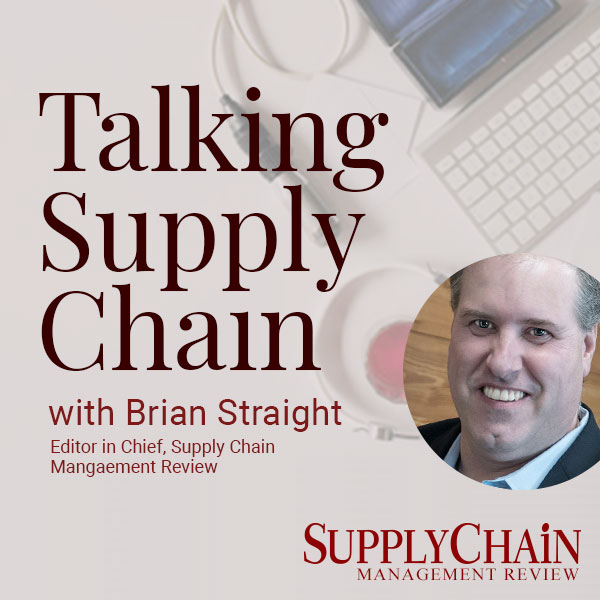This month we spoke with Evan Garber, president and co-founder of warehouse management system supplier EVS. The company was originally focused on process manufacturing and warehouse software for food and chemical manufacturing prior to selling that business to Infor in 2017. Today, EVS focuses on native cloud-based WMS on iOS devices as a native app.
NextGen Supply Chain: You have often spoken about AI and its use in the warehouse. Tell us a little bit about what AI brings to the average DC.
Garber: Right now, the average DC doesn't have any AI at work. But when you think about it, AI is a no brainer to maximize management of warehouse activities.
The technology has the potential to make facilities much more productive. It opens doors to doing more with less and trimming down the cost to serve the consumer as much as possible. I'm sure those objectives line up directly with what's going on at most warehouses these days. AI makes that possible by analyzing data and identifying relationships that humans wouldn't or couldn't make.
For instance, you've got to pick 1,000 orders today. What's the best way to get those 1,000 out the door when you've got to manage omni-channel distribution: picking of each for e-commerce orders as well as partial and full pallet loads, not to mention labor capabilities and costs? Typically, your WMS, which is fairly static, makes all key order management decisions based on pre-defined algorithms. AI literally takes WMS to the next level, determining the most effective and least expensive way to manage those orders dynamically in real time.
It takes into account not just the orders but inventory availability, labor availability and cost, warehouse layout and even grouping of orders and lines, to achieve the most efficient pick path, to name a few variables. AI crunches that and still more data to build the plan for the day and direct activities through the WMS. By the way, today's plan will be different than yesterday's and tomorrow's even if the same orders require fulfillment.
NextGen Supply Chain: That said, what's the difference between a WMS without AI and one with?
Garber: Traditional WMS is very reliant on humans and their input. Sure, it uses simple algorithms but creates relatively static solutions compared to a WMS with AI. That takes massive amounts of data. AI analyzes all of it and directs operations on the fly rather than to preset routines. It is constantly evolving and highly dynamic.
We all realize how much more complicated it is becoming to run a DC these days. And the more complicated it becomes, the greater the demand for AI. Let's face it, as data increases humans become less productive. At the same time, as data increases the more productive and intelligent a WMS with AI gets.
NextGen Supply Chain: Where do we stand on the introduction of AI to the warehouse?
Garber: The concept clearly has people's attention. But we are still in the early developmental days of AI as a part of a WMS. It's still a concept. But not for long.
At EVS, we are at the stage of collecting data for AI to crunch. For instance, we're using iPhones as sensors to collect data such as pickers' locations throughout the day and how they spend their time from picking to attending meetings. I mention those because it makes clear how AI is able to evaluate data that isn't even part of the discussion today.
We're not quite at the point of having actual AI running on the WMS yet. We're really at the intelligent algorithm stage.
During the next couple of years, we'll determine what can be done with the data as the algorithms advance and AI starts to learn from warehouse activities. AI will identify relationships that we don't even know exist today. For instance, slotting will become highly dynamic and be reconfigured on-the-fly rather than weekly or monthly. And we both know that those DCs that re-slot weekly are in the top echelon today. Over time, those AI capabilities will be rolled out to other parts of the warehouse and DC.
NextGen Supply Chain: Looking out still further, will AI's impact be contained within the four walls?
Garber: No. Instead, AI will fundamentally change the entire relationship between a warehouse and the supply chain. With AI in place, the warehouse will become an intelligent node in the supply chain. In five years or less, warehouse nodes will connect to each other and with carriers. What's going on here is an amalgamation of bits and pieces of data from many more nodes in the supply chain than can currently be accessed. Try to do that without AI.
Interestingly enough, once that network is established, the supply chain outside the warehouse will affect what happens within the four walls. That is barely happening today. Other than expected ship and receipt dates entered into the ERP, the supply chain has virtually no impact on what happens inside the four walls of a warehouse. Add AI to WMS and it will be possible for events in the outside supply chain (delays in shipping due to weather, vendor inventory shortages, to name two) to impact daily activities on the warehouse floor from slotting to the picking process. It will be a natural evolution.
Gary Forger is special projects editor for Supply Chain Management Review. He can be reached at [email protected].
SC
MR


More Events
- Next-Gen SupplyChains: Underpinning your ability to manage complexity and drive innovation
- The Future of Supply Chains: Next-Generation Technology and Beyond
- Thanks to all who made NextGen a success
- Medline Executives’ Keynote to Kick Off NextGen Supply Chain Conference
- NextGen Supply Chain Conference 2022: About our event
- Industry Innovators Take Home 2022 NextGen Supply Chain Awards
- More Events
Latest Podcast

 Explore
Explore
Topics
Software & Technology News
- AI, virtual reality is bringing experiential learning into the modern age
- Humanoid robots’ place in an intralogistics smart robot strategy
- Tips for CIOs to overcome technology talent acquisition troubles
- Game on: Rethinking change management for the digital era
- Predicting stockouts: Enhancing FMCG resilience through data-driven insights
- Top Performers Investing in, Benefitting from AI
- More Software & Technology
Latest Software & Technology Resources

Subscribe

Supply Chain Management Review delivers the best industry content.

Editors’ Picks




